Nina MacLaughlin's Blog, page 18
November 2, 2015
A short postcard from Mexico City. The costumes in the Zócalo...
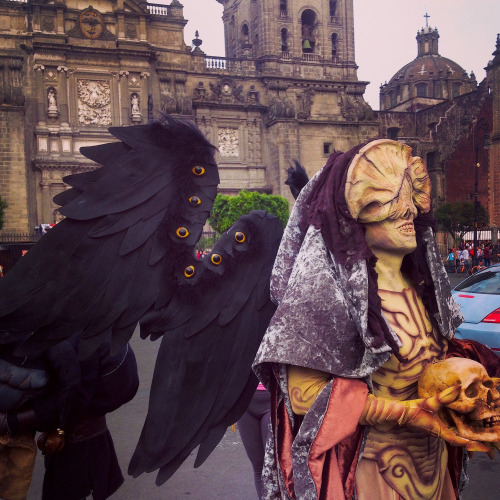
A short postcard from Mexico City. The costumes in the Zócalo yesterday for Day of the Dead were frightening. Monstrous, macabre. But not in all my life have I heard a noise that so signaled doom as the bells that rang from the Metropolitan Cathedral behind this black-winged creature. The sound washed over the massive plaza, discordant, registering in the chest, the skull, places in the brain you don’t always want to access. The largest of the twenty-five bells in the tall towers weighs 29,000 pounds. I heard every ounce of it. And now, as I try to remember what it sounded like, having heard it just yesterday, I cannot recall. A muteness in my memory, ghost sound, and that somehow renders it all the more awe-ful and all the more terrifying.
October 21, 2015
Boston friends, local readers, this weekend is the Boston Book...
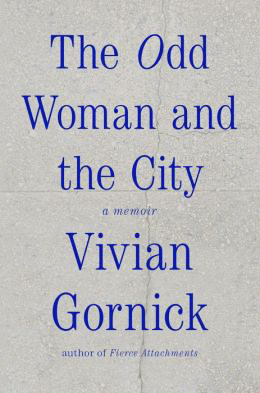
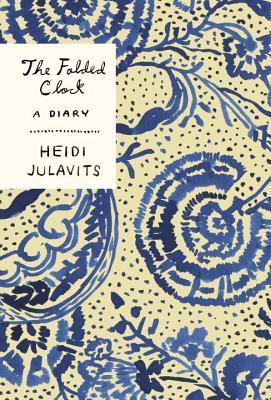




Boston friends, local readers, this weekend is the Boston Book Festival, and there’s a huge amount of amazing stuff to see.
I’m very excited (and very fucking nervous, to be honest) to be doing a panel with VIVIAN GORNICK and HEIDI JULAVITS on memoir, moderated by Vogue’s MEGAN O’GRADY. If you’re in town, you should come. I think it’s going to be good.
Saturday, October 24, 12:30 pm
First Church Sanctuary
66 Marlborough Street, Boston
But Enough About Me: Reimagining the Memoir
As the memoir continues its reign, it has also continued to surprise and
captivate us, raising provocative questions about truth, memory, and
the different ways we tell the story of ourselves. Critic Vivian Gornick’s newest memoir, The Odd Woman and the City,
recounts her long romance with New York through razor-honed outtakes
from a life lived on her own terms, outside the conventions of marriage
and family. Novelist Heidi Julavits’s collection of personal essays, The Folded Clock,
blends memoir and journal, with wry, minutely-observed meditations on
friendship, aging, and the selves we leave behind. And
journalist-turned-woodworker Nina MacLaughlin, author of Hammer Head: The Making of a Carpenter,
explores the challenges and freedom she found in a hands-on avocation,
one rarely taken on by women. Come join these three masters of the form
in a discussion moderated by Megan O’Grady, book critic at Vogue.
October 19, 2015
October 15, 2015
The beam in the basement that helps hold up the house is in
a...

The beam in the basement that helps hold up the house is in
a state of failure. The house is sinking. We were hired to put in new columns to
help bear the load. A straightforward situation: dig some holes in the basement
floor, pour some concrete, jack up the house to remove the weight from the old columns
that aren’t doing anything, and put some new columns in place. Except the beam,
when we began to raise the house with the mighty jack, cracked and checked;
dark fissures began to grow and gape in wood that’s been bearing weight for a
century or more. And below, the existing concrete floor began to cave. The
basement floor is a potato-chip layer of concrete ontop of sand. When this
became clear, M. used the phrase “worst case scenario.” The pressure is too
much. Time and weight combined to have their way against mistakes made
generations ago. The foundation isn’t strong enough, and everything’s
collapsing.
Sometimes metaphors are too easy. Standing in the basement
these last days, the risk of a house coming down upon us, watching the supports
crumble, seeing the floor disintegrate beneath us, what could I think about but
the things you need to keep something supported, strong, stable, safe, and it
felt too heavy a load for my mind. Work imitating life in so obvious a way, too
much, too much. A faulty foundation, inherent imperfections, problems growing
quietly in time until it’s all too much to fix. It is fixable, and we will, new
supports to bear the present-tense weight, but it doesn’t feel like that right
now. Right now, things feel sunken, unlevel, crumbling, collapsing, collapsed.
October 2, 2015
Here’s an obviousness: moving is exhausting. You wake up one...
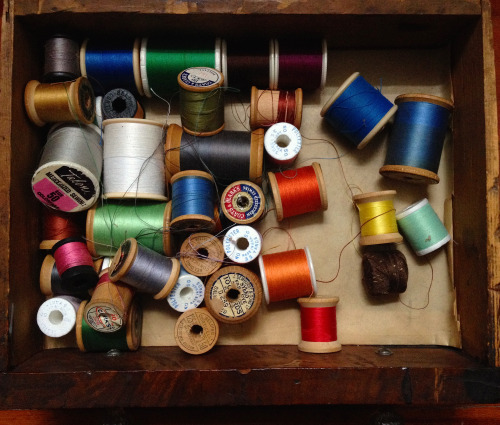
Here’s an obviousness: moving is exhausting. You wake up one morning in the home you’ve had, and that night go to sleep in an echoey and unfamiliar new room, aching and surrounded by boxes. It’s not the shift of turtle shells that’s so tiring, though adjustment has a subtle way of wearing one out. More so, it’s that the process forces you to lay your hands on every object you own. It’s a sort of time travel, a confrontation with all the stages of your living.
Two weeks ago, I packed my belongings in the span of some painful days. In doing, I sped backwards and forwards through time. Here, in my hands, a drawing from when I was eight years old: a round lump of baby on the grass, SAM, my little brother’s name written above with an arrow pointing to him, tears shooting out of his eyes; he was scared! To the right of him a giant tiger approached, fangs dripping blood; me, older sister, in the far right corner of the drawing, arms up, yelling NO, NO. Into a box it goes, not without thoughts of what my eight-year-old self was thinking about my new small brother and tigers and vulnerability and protection.
The next moment I’m holding a passed note from middle school with Lindsay about a crush on Robbie and whether we’d scrimmage the boys team at soccer practice that night. We were in Mrs. DeMerritt’s science class, and it dredges the memory that curly-haired Mrs. DeMerritt did not once, during the whole of the school year, wear the same outfit twice. Do I save this note? Yes. Because it triggers memories that maybe I’ll need again someday to access. The charged thrill of playing against the boys at soccer practice, the sanctioned press against them for the ball, see-your-breath chill in the dim evening air on the fields behind Wheelock School. The disbelief that someone could own a hundred and eighty dresses.
I touch high school notebooks, college notebooks. Some stay, some discarded. I am in a dingy anarchist-run coffeeshop in West Philadelphia reading Plutarch, lonely, nineteen, having just been introduced to chai. I flip through stacks of photographs. I trash an entire photo album of travel in Europe with a former boyfriend who I still, fourteen years later, wish ill. I save one photograph from Norway. It has no people in it. Here I am at eleven, at twenty-four, at seventeen, at thirty. Time pounds and crashes like waves swollen in a storm. Here are my brothers, my parents, my friends, my loves. Some of whom remain, some of whom have turned to ghosts, not from death but other sorts of absences. Remember, remember, ache, and long.
Here, unpacked, in my new home, which doesn’t feel yet like home, I am surrounded by myself. My life feels distilled, concentrated, in a way that’s burdensome, oppressive, and uncomfortable. Much of my furniture – desks, bookshelves, tables, a sofa, my bureau – comes from houses I grew up in. The objects are threads that tie me to past places, past times, past people. And some of these pieces were in houses where my mother grew up, in houses where my grandmother grew up, belonged to family members long-dead I never knew. I feel the weight of that history as I look around. How do we escape ourselves?
In an old sewing table that I haven’t found a place for, I open the small drawers. One is filled with spools of thread. In another, scraps of fabric, an envelope labeled in neat cursive I don’t recognize, piece from blue velvet couch. Whose? I wonder. Where? I remove the swatch, rub it between my fingers, put it to my nose to smell. Dust, time. I find below the fabric another envelope. Inside is a thin slab of smooth rock, about the size of a maple leaf, brown, vaguely heart-shaped, with a darkness in the center, deep and galactic. Held up to the window, light shines through webbed spots. The typed letter that accompanies it, dated October 14, 1983, explains more. Addressed to a Dr. Shneidman, Professor of Thanatology, it explains that the piece is a fossilized cross section slab of the spinal cord of a whale. I hold it, look again. How old? I wonder. How long gone? Here in my hand, its life is distilled and condensed by time, relic, remains. Prehistoric. A different sort of weight of years descends, vast, absorbing, incomprehensible, and I find I do not want it in my hands. And there on the table, a letter addressed to a professor of the study of death. What have I found? What have I lost? I fold the letter around the fossil, slip them back into the envelope, bury it at the bottom of the drawer. And I return to the spools of thread and am astonished how strands so thin can help mend holes, make seams, sew things back together. Our patchwork selves, time threaded.
September 29, 2015
In the summer stretch between May and September of 2013, a
blaze...
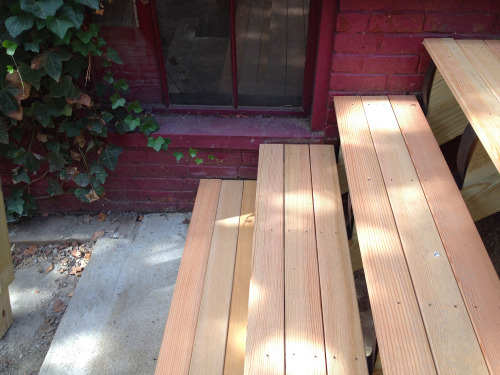


In the summer stretch between May and September of 2013, a
blaze of arsons took place in Somerville. Eighteen or more housefires were
reported; no one was caught. The house we’re working on, building a small deck
off a side door, was one of the victims. You wouldn’t know to see it now.
Lovely, inside and out. Outside, eggplant paint, expensive windows. Inside,
beautiful tile, colorful pillows, the only wallpaper I’ve ever admired. But
photographs from two summers ago show a charred western side of the three story
house, firefighters gathered at their ladders looking at the damage. Broken
windows, ash, smokestain, wreck. When I sleep in new bedrooms, I consider
routes of escape. Not in case of fire, but in case a plane were heading
straight towards the bedroom, in through the window of whatever room I’m in.
How would I get out? For a few days as we worked, the side door was boarded shut to prevent anyone from wandering out and tumbling into the void left by
the dismantling of the old deck. One less door. No exit. Not this route. I
wondered if they thought about it before sleep, the couple who lives in this
burn victim. I wondered if they mapped in their minds how they would get out. I
wonder what to make of how much my own mind these days has been occupied by escape.
September 21, 2015
In
Target, in the aisle of the coffee machines, an old woman started
speaking to...
In
Target, in the aisle of the coffee machines, an old woman started
speaking to me in Portuguese. It didn’t seem to matter that I didn’t know the
words, not to either of us. She wasn’t asking for help; there was nothing
questioning about her speech. She talked and talked. I made out the words love and god and she pressed her hands over her heart and smiled which I
translated as the happiness born of love, and she mimed tears, twice, drawing
her finger down her cheek, which I translated as the sadness born of love. She
touched my arm, dirty from digging four-foot holes in the Somerville dirt that
day for a deck we just started building. She had a magic touch, tender,
warm, rare, a contact with the palm that spreads to feel like your whole self
is being embraced. She talked and I stood by, my cart loaded with stupid
objects of living – a tray to divide forks from knives from spoons, a spool to
load with toilet paper, a shower curtain, a can opener, and in my hands I held
a stovetop espresso maker, like the one I’ve screwed together and lit a flame
under almost every morning for the last five years. Like the one at home,
except home isn’t home because I moved out of it on Tuesday. And the woman spoke and I didn’t understand, and I did, and I tried not to cry
and she leaned in and kissed my cheek, as though she was my grandmother, had
known me all my life, and loved me.
September 11, 2015
“I hate that I have a bad rap because of you,” said the
seventh...
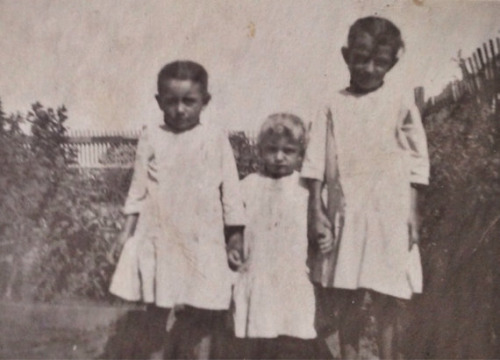
“I hate that I have a bad rap because of you,” said the
seventh grader to his ninth-grade brother on the afternoon of the first day of
school.
“I didn’t give you a bad rap,” said the ninth grader, hurt
at the edge of his voice.
“Yes you did. I hate it,” said the earnest middle sibling
eating cheesy popcorn out of a small plastic bowl.
“Zack’s being a mom-hogger,” said the fourth grade girl of
her ninth grade brother.
“Am not,” said Zack. Poor Zack! Attacked from all sides.
“Then why is she biking to school with you tomorrow?”
“Because she needs to know how long it takes to bike so we
know when I should leave the house in the morning! God, Jessie!”
“Mom-hogger,” she said again, quietly.
The three kids shout at each other, tattle about TV
watching, video games, homework, snacks. They talk about Magic the Gathering
and their favorite Life Saver flavors (“Pomegranate,” said the seventh grader.
“There is no such flavor as pomegranate,” said his sister, “you’re talking
about grape.” “No I’m not. I’m talking about pomegranate.” “You mean grape.”)
We’ve been there a couple weeks, building a bathroom where there was none and enlarging
and renovating one that existed. There’s a trampoline in the backyard. The kids
bounce, whack each other with pool noodles, wrestle, and for twenty minutes
last week, on one of the last afternoons before school started, when the sun
had shifted west enough to leave the yard in shade, the fourth grade girl and
her seventh grade brother lay on it together, he using her as a pillow, head on
the small of her back. They were so still. Inside, there are stuffed animals on
the beds of the boys, matted, well-loved. How perfectly mixed up they all seem,
cusping, verging. Angry, raging one moment, calm and loving the next, limbs
tangled on the sofa. How churny this age, I thought at first. But how familiar.
It’s not just this in-betweening, this slow shed of kid-dom. Maybe it’s embarrassing
to admit how familiar this felt, how mixed up I still feel most of the time. What
do we ever outgrow?
August 19, 2015
Adam Reilly, a host for the show Greater Boston, was a colleague...
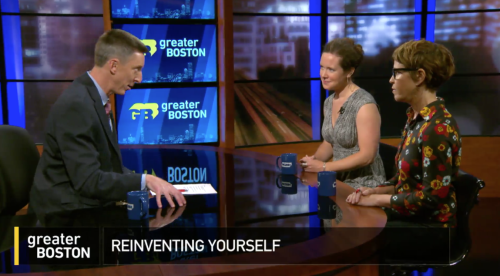
Adam Reilly, a host for the show Greater Boston, was a colleague of mine at the Boston Phoenix, and ranks as one of the best people I know. I was excited to the max when he asked me to join him, and rock-critic turned rock-musician Joan Anderman, to talk about HAMMER HEAD and career reinventions on the show last night. You can watch the clip (and my maniac eyebrows) here.
August 15, 2015
To the Mouse I Murdered This Morning
I saw you. In the dim light after dinner you walked across the kitchen floor, brazen, looking for crumbs. “Hey,” I said from the couch, insulted that you could wander by so casually. I am so much bigger than you, after all, don’t you know? And I have gotten so tired of finding shits on the stovetop in the mornings, like grains of black rice, evidence of your existence, your nightly visits to nibble and lick. Enough, enough. Gray invader, find another place. Please. I said “Hey,” and you scurried off behind the stove. That’s where you run off to, you and your brothers and sisters who have made a home in this home. And so I put out a trap, those awful sticky traps, in the narrow space between the wall and the stove and I thought: I will get you. And I did, I did. I got you. I knew I would and I did. In the morning, there you were, curled like a comma around the small cloud of marshmallow that was meant to tempt (I ate all the peanut butter). And your jaw was stuck and all of your tiny feet and your soft grey belly and you wriggled, your ribs twitched back and forth. Oh god, oh no. Please, small friend, please die of a heart attack, please. I wished that on you. Your black eyes shined. And I left you there, I left you there on the stick in the small dark space between the wall and the stove. And when I returned, I hoped you had died of a heart attack, but you squeaked instead when I put down a bag of groceries and I crouched down and looked at you, I looked and looked, and your black eyes shined and your ribs twitched and oh god oh no, this is no way for a creature to be and I considered my options. Suffocation: a plastic bag. Drowning: into the toilet. Discarding: out in the trash bins for the raccoons to do what they will with you. The word humane kept rushing across my mind. Humane, humane. I am a human and you are a mouse and I am bigger than you and you shit on the stove but your black eyes shine and I wish you could talk and I wish you lived in my pocket as a friend, you small soft animal with a beating heart and a brain that knows fear. I put you in a ziplock bag and sealed it. I’m sorry. I put that bag inside two plastic grocery bags. I’m sorry. I’m sorry. I pulled the cast iron pan from the low shelf, the biggest one, the one that’s so heavy I have to hold with both hands. I’m sorry I’m sorry I’m sorry. Who am I? What am I doing? Monster, brutal huge murdering monster. I held the pan up to my chest. I’m sorry I’m sorry I’m sorry. I dropped it on you. It was so loud. I’m sorry I’m sorry I’m sorry I’m sorry I’m sorry I’m sorry I’m sorry. To your brothers and sisters, come shit on the stove if you want because I don’t know who I am and I won’t murder anymore.



